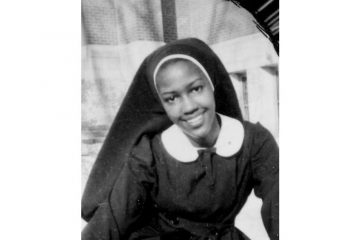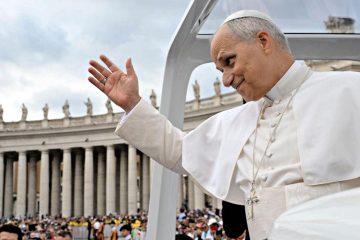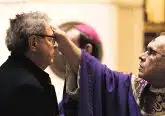What the Eucharist Teaches us About the Moral Life

Every rite, ritual, discipline and devotion of the Catholic Church is ordered by and around the Eucharist, which the Second Vatican Council calls the “source and summit of the whole Christian life” (Lumen Gentium 11). The Catechism of the Catholic Church (CCC) further underscores that “the moral life finds its source and summit in the Eucharistic sacrifice” (CCC 2031). These are not mere academic observations, but rather calls for intentional devotion to the celebration of the Eucharist in all its richness, beauty and grace.
When we contemplate the Eucharist, our minds are typically drawn to one or both of two characteristics. Most immediately, the Eucharist is the perpetuation of the crucifixion of Christ through time. In its continuous participation in the atoning death of Christ, the Eucharist makes that sacrifice present to us in a real, albeit mysterious, way. Christ on the cross at Golgotha is Christ on the altar at Mass. He is “really present” in one place for all time.
A second prominent understanding is that the Eucharist is a “love feast,” as it was called in the early Church. It draws the disciples of Christ around a common table. The Eucharist challenges us to overcome differences in national, linguistic and demographic characteristics, making us one in Christ who saves us. We are all in need of salvation and united by the Eucharist in which this is accomplished. The Eucharist is both the means of our salvation and the sign of Christian unity.
We might call these aspects the “soteriological” meaning of the Eucharist, from the Greek word for “salvation.” As the perpetuation of the saving death of Christ, the Eucharist is at the center of our hope for the forgiveness of sin and our hope of eternal life. These theological understandings of the Eucharist are right and proper, and we do well to affirm and emphasize both in our Eucharistic devotion.
MORAL MEANING OF THE EUCHARIST
In addition to these characteristics of Eucharistic theology, however, we should take into consideration the moral meaning of the Eucharist. Yes, it is the summit of faith and the source of salvation; but as such it is a rich source of moral reflection and means of moral development.
As a threshold matter, the Eucharist reminds us that Catholic moral theology is primarily concerned with the kind of people we are, not the things we do. We emphasize the formation of a certain kind of person, rather than dictating lists of proscriptions. We begin with virtues, not rules. Those virtues are formed as we develop the habits and practices of discipleship, in imitation of Christ.
This is not to say that our actions are unimportant. Indeed, habits are an essential aspect of growing in virtue. But we emphasize virtue over rules because our concern is with the formation of souls, not keeping rules. One can keep rules without being virtuous. But if one is virtuous, one will consistently keep the rules. Put another way, obedience follows virtue; but virtue does not necessarily follow obedience.
Thus, of course, the Eucharist does not give us a list of things we must do. Rather it calls us to order our souls around Christ’s sacrificial self-gift, His selfless offering. We eat and drink the Body and Blood of Christ in obedience to His command. But before we consume the Eucharistic feast, we observe the sacrifice. And what we observe is the example for our own intentional offer of service to one another. “If any man would come after me,” says our Lord, “let him deny himself, take up his cross and follow me” (Mt. 16:24). And when Christ calls us “to be perfect as [our] heavenly father is perfect” (Mt. 5:48), he shows us what that means in the sacrifice of the Mass, the Eucharistic feast of self-gift.
On Holy Thursday 2003, Pope St. John Paul II summarized this feature of the Eucharist in his encyclical, Ecclesia de Eucharista (EE). In the Eucharist, the pope explained, the Church “discovers the full manifestation” of Christ’s boundless love (EE, 1). As such, the Eucharist is the center of our own moral training and discipline. “Every commitment to holiness, every activity aimed at carrying out the Church’s mission, every work of pastoral planning, must draw the strength it needs from the Eucharistic mystery and in turn be directed to that mystery as its culmination” (EE, 60).
The sacrifice of Christ in the Eucharist is not only the means of our salvation, but also the source of our moral lives. To the extent that we fall short—to the extent that we fail to love one another—the Eucharist is the means by which we may overcome. Thus, devotion to the Eucharist is not an avoidance of moral action, but the model for it. As Pope St. John Paul II summarizes, “Were we to disregard the Eucharist, how could we overcome our own deficiency?” (EE, 60).
 Dr. Kenneth Craycraft holds the James J. Gardner Chair of Moral Theology at Mount St. Mary’s Seminary & School of Theology. He is the author of Citizens Yet Strangers: Living Authentically Catholic in a Divided America (OSV 2024).
Dr. Kenneth Craycraft holds the James J. Gardner Chair of Moral Theology at Mount St. Mary’s Seminary & School of Theology. He is the author of Citizens Yet Strangers: Living Authentically Catholic in a Divided America (OSV 2024).
This article appeared in the June 2024 edition of The Catholic Telegraph Magazine. For your complimentary subscription, click here.













